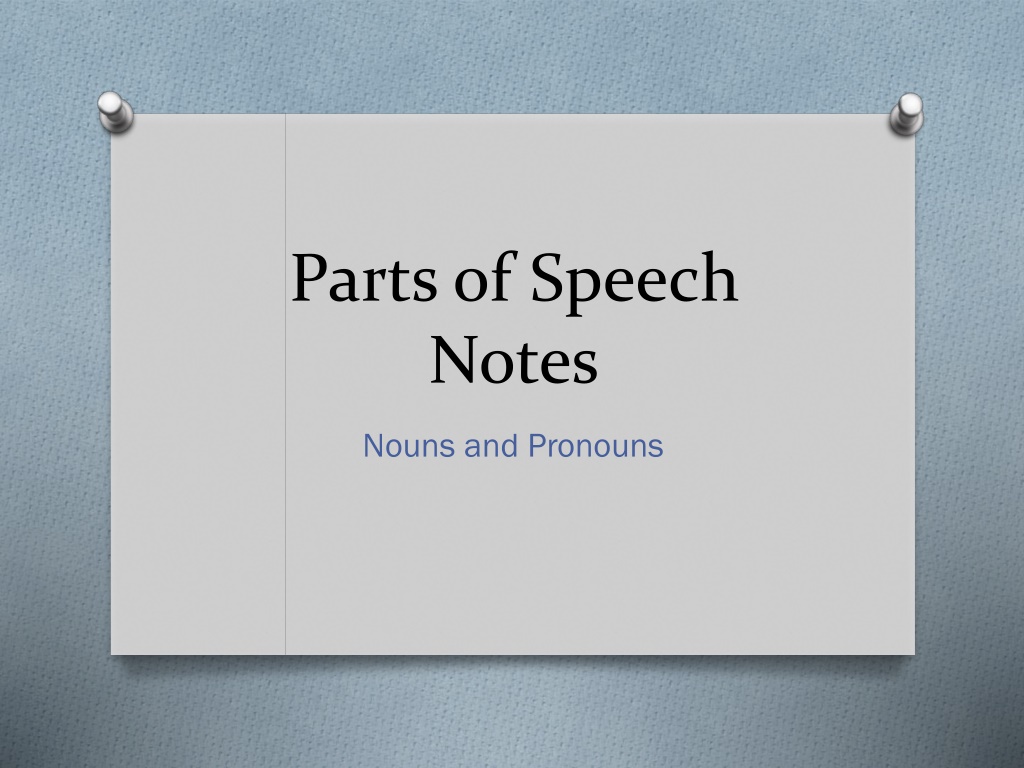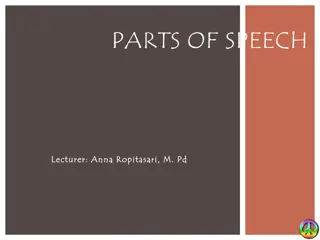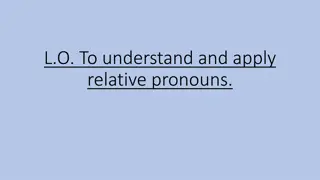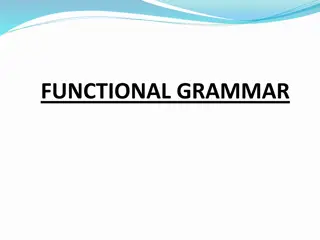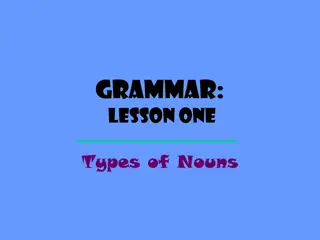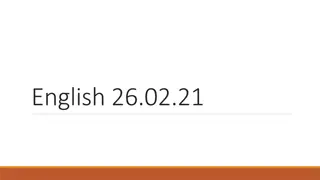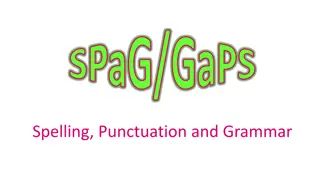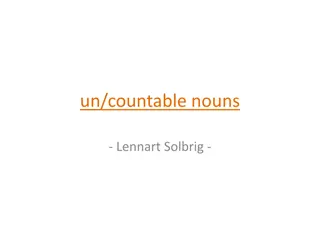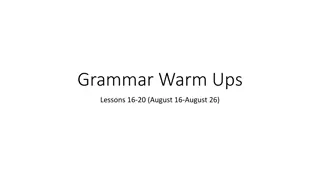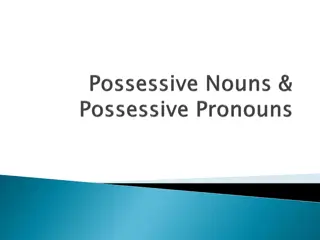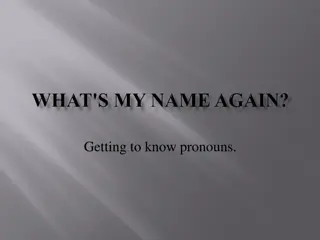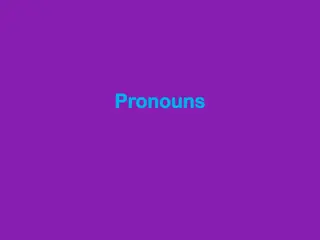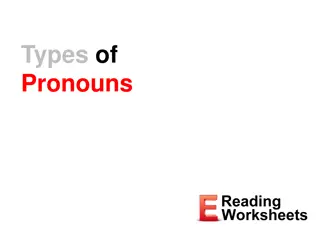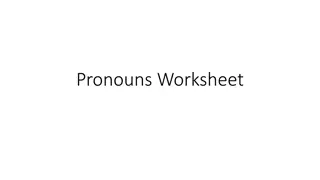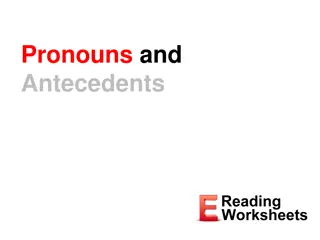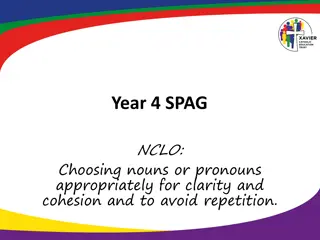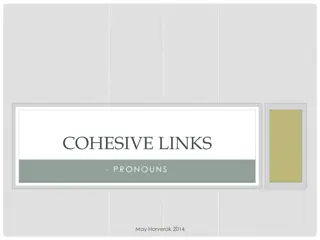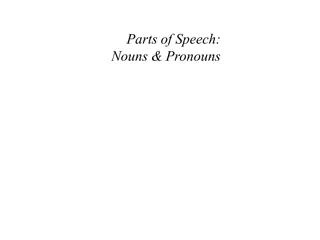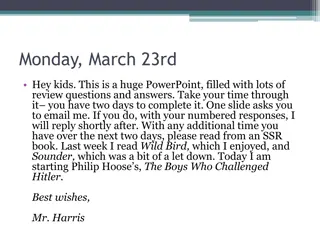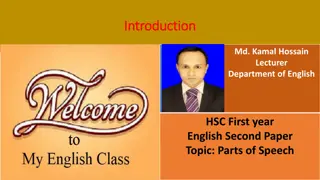Understanding Nouns and Pronouns in Grammar
Dive into the world of nouns and pronouns with this comprehensive guide. Learn about different types of nouns such as concrete, abstract, collective, and compound nouns. Explore the distinction between common and proper nouns. Discover the role of pronouns as words that substitute for nouns, including personal, reflexive, and reciprocal pronouns. Enhance your grammar knowledge and linguistic skills through clear explanations and illustrative examples.
Download Presentation

Please find below an Image/Link to download the presentation.
The content on the website is provided AS IS for your information and personal use only. It may not be sold, licensed, or shared on other websites without obtaining consent from the author. Download presentation by click this link. If you encounter any issues during the download, it is possible that the publisher has removed the file from their server.
E N D
Presentation Transcript
Parts of Speech Notes Nouns and Pronouns
Nouns O A noun noun is the part of speech that names a person, place, thing, or idea. O A concrete noun concrete noun names something you can see, touch, taste, hear, or smell. O Examples: person, cannon, road, city, music O An abstract noun abstract noun names something you cannot perceive through any of your five senses O Examples: hope, improvement, independence, desperation, cooperation O A collective noun collective noun names a group of people or things. O Examples: army, choir, troop, crew, class, faculty O A compound noun compound noun is a noun made up of two or more words acting as a single unit. O Examples: life preserver, coffee table, self-rule, daughter-in- law, battlefield, dreamland
Nouns O A common noun names any one of a class of people, places, or things. O Examples: building, writer, nation, month, leader, place, book, war O A proper noun names a specific person, place or thing. Proper nouns are capitalized, but common nouns are not. O Examples: Revolutionary War, White House, Mark Twain, France, June
Pronouns O Pronouns are words that stand for nouns or for words that take the place of nouns. O Antecedents of Pronouns- Pronouns get their meaning from the words they stand for. These words are called antecedents. O Examples: The arrows point from pronouns to their antecedents. O Michael said he lost his watch at the fair. O Because of its carnival, Rottweil, Germany is my favorite city.
Personal Pronouns- Refer to the person speaking (1stperson), the person spoken to (2ndperson), or the person, place, or thing spoken about (3rdperson). Singular Singular I, me, my, mine You, your, yours He, him, his, she, her, hers, it, its Plural Plural We, us, our, ours You, your, yours They, them, their, theirs First Person Second Person Third Person A reflexive pronoun reflexive pronoun ends in self or selves and indicates that someone or something in the sentence acts for or on itself. An intensive pronouns intensive pronouns ends in self or selves and simply adds emphasis to a noun or pronoun in the sentence. Example: I mowed the lawn myself. Singular Singular myself yourself Himself, herself, itself Plural Plural ourselves yourselves Themselves First Person Second Person Third Person
O The Reciprocal Pronouns Reciprocal Pronouns each other and one another refer to a plural antecedent. They express a mutual action or relationship. O Examples: O The two dogs shook water all over each other. O The class collected books from one another. O A Demonstrative Pronoun Demonstrative Pronoun directs attention to a specific person, place, or thing. SINGULAR SINGULAR This, that PLURAL PLURAL These, those O A Reflexive Pronoun introduces an adjective clause, and connects it to the word that the clause modifies. Reflexive Reflexive Pronouns Pronouns That Which Who Whom Whose
O An interrogative pronoun interrogative pronoun is used to begin a question. O Example: Who picked up the children? O An indefinite pronoun indefinite pronoun refers to a person, place, or thing that may or may not be specifically named. Singular Singular Another Everyone Nothing Anybody Everything One Anyone Little Other Anything Much Somebody Each Neither Someone Either Nobody Somethin g Everybody No one Plural Plural Both Few Many Others Several Both Both All Any More Most None Some
